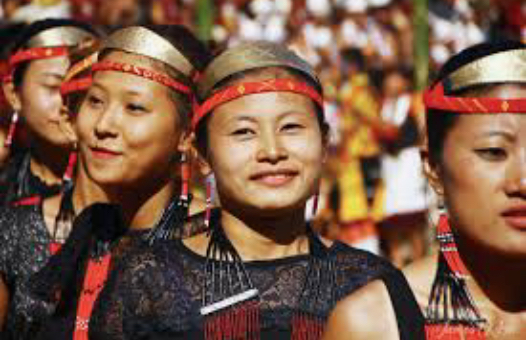

Image credit: the Naga republic.com
By North East Network (NEN) Nagaland
Introduction
North East Network (NEN) is a women’s rights organization, working in the states of Assam, Meghalaya and Nagaland. Since 1995, NEN has been working on issues of Gender-based Discrimination and Violence against Women (GBDVAW), Governance, Natural Resource Management and Livelihoods, through community mobilisation, awareness raising, capacity building, research and documentation, networking and advocacy. NEN is committed to gender and social justice, and respect human rights of all.
In Nagaland, NEN has been working very closely with women farmers, home based workers and vendors in the districts of Kohima, Dimapur and Phek. It attempts to adequately address the livelihood rights of the diverse informal sector workers. NEN is a facilitator in visibilising the contribution of women workers in unorganised and informal sector to the nation’s economy. It attempts to ensure due recognition and support from the state to improve the lives and livelihoods of the women workers. It continues to build capacities of the women within its area of work to become self-reliant economically, socially and politically. (For for information, please visit www.northeastnetwork.org)
India’s democratic principles, found both in the constitution as well as in the spirit of its people need to be valued and sustained for more than one reason. Firstly, the duty of the government is to instill confidence in its citizens and secondly, to fulfill state obligations on sustainable development goals. It is therefore clear that the citizens of Nagaland are looking for a stable, efficient and honest government in the forthcoming 2018 elections. We, the North East Network (NEN) therefore lay our concerns with a hope for capable leadership, better governance and inclusive approach in its policies and programmes.
Context
In Nagaland, agriculture and allied sector provide livelihoods to majority of its population. About 65% of women in Nagaland are directly involved in farming and food producing livelihoods, yet their participation and contribution continue to be unaccounted, unrecognised and unprotected. While agriculture has been the primary livelihood for many, women also are engaged in peripheral livelihoods such as weaving, vending, foraging, food processing.
We bring to light the frail situation of this large group of unorganised workers in the state. Hereby, we assert our inalienable human rights as framed in the fundamental principles of the UDHR and the Indian Constitution. Keeping in mind the United Nations Sustainable Development Goals (SDG) particularly #Goal 1: Ending poverty # Goal 2: Zero Hunger #Goal 5: Gender Equality #Goal 8: Decent work and Economic growth #Goal 11: Sustainable Cities and Communities and #Goal 13: Climate Action, the following (Key Asks)/Demands has been collectively consolidated over a number of consultations and discussions. We urge your leadership to take up the following points in your future plan of action.
Key Asks/Demands
A. Women and Livelihoods:
- Promote and support diversity-based ecological agriculture where small and marginal women farmers are involved. Support growing food crops to ensure food and nutritional security and protect the environment from adverse affects of chemical based farming. Ensure effective implementation of Nagaland State Organic Policy.
- Support for running seed banks: Recognise traditional knowledge of women farmers in conservation of genetic diversity and provide infrastructural support for women-led seed banks. Innovative indigenous practices of seed preservation, procurement and distribution which values traditional seeds of farmers need to be prioritised.
- Integrate with MGNREGS: Small and marginal women farmers should be recognised and supported to include their land based activities into Government programmes like MGNREGS. Strengthen and monitor existing guidelines on at least 60% allocation of MGNREGS funds for agriculture and allied activities in villages through development of land, water and trees.
- Mainstream women farmers in all Government programmes: Government should make policies which recognise women’s work in agriculture by providing support in all spheres of intervention related to rural farm livelihoods. Include and increase women farmers as farm extension workers and resource persons to bridge the information gap. Schemes and input services should be demand-driven.
- Adoption of appropriate technology for gender inclusiveness: This includes technical support for developing innovative women friendly tools and appropriate technology for hilly terrain. Innovative, cost effective food-processing technology to decrease drudgery should be developed and made available, accessible and affordable for women farmers.
- Enhance access to credit and working capital for women farmers and their collectives; provide infrastructure support, Kisan Credit Card and simplify procedures for opening bank accounts.
- Universal coverage for Social Security Schemes: All women workers from the informal sector/ farm women should be able to access universal coverage for all social security schemes such as pension, maternity entitlements, health, accident and life insurance. Activate the Nagaland State Unorganised Social Security Welfare Board and implement the Unorganised Workers’ Social Security Act 2008 in reality.
- Recognise and promote traditional livelihoods such as loin-loom weaving and provide marketing linkages.
- Augment women’s access to market: Create infrastructure for affordable transportation of agricultural produce from rural to urban areas; develop collection centers in rural areas and dropping points in towns, enable women farmers’ access to markets.
- Recognise vending as a major livelihood initiative in urban poverty alleviation: Make street vendors an important component in the smart city plan as they are an integral part of the food distribution system. Create provision of vending zones for women street vendors, market yards for women wholesalers and suppliers. Take proactive role in allocating space to local women vendors in the market at affordable rent even for built up space. Ensure safe working spaces with adequate toilet infrastructure, effective waste management strategies, regulated and monitored taxation.
- Support for a State Policy for Street Vendors and implement the National Street Vendors (Protection of Livelihood and Regulation of Street Vending) Act 2014 and see that women are well represented in the town vending committees.
B. Women Safety & Political Participation
12. Ensure gender justice in political participation: Initiate gender inclusiveness and affirmative action in decision making bodies at diverse public and community institutions in both Rural and Urban Local Bodies.
13. Proactive implementation of Protection of Women from Domestic Violence Act 2005, (PWDVA): Support the implementation of PWDVA adequately; allocate sufficient resources for facilitating its access in both rural and urban areas.
14. Ensure safety and security for women in their workplaces and in public places: Support the implementation of Sexual Harassment of Women at Workplace (Prevention, Prohibition and Redressal) Act 2013. Establish functional Internal Committee (IC’s) and Local Committees (LC’s) at the district level as per the Act in every institution and jurisdiction related to workplace. This provides both formal and informal sector workers particularly vendors, domestic workers and daily wage earners access to the grievance redressal mechanism.
NEN in Nagaland representing the women’s voices and concerns hope that the specific Key Asks/Demands are seriously taken into consideration and adequate action by the aspiring Nagaland Legislative Assembly Members, policy makers and state implementers.
__________________________
For North East Network (NEN) Nagaland
Email: nagaland@northeastnetwork.org



